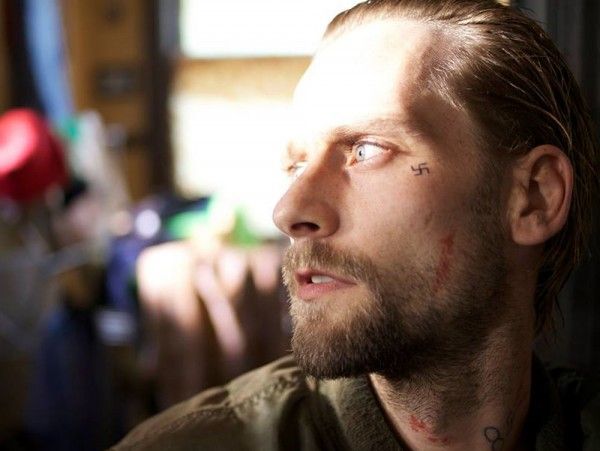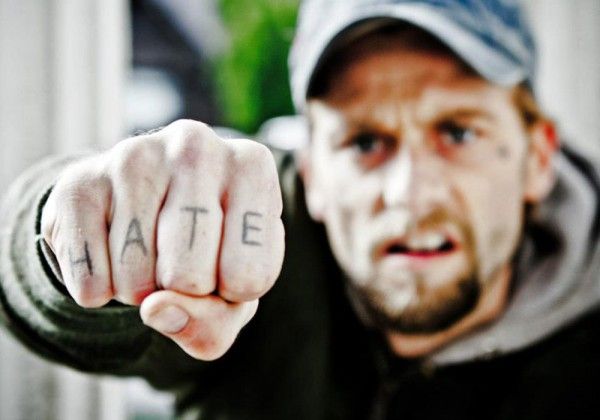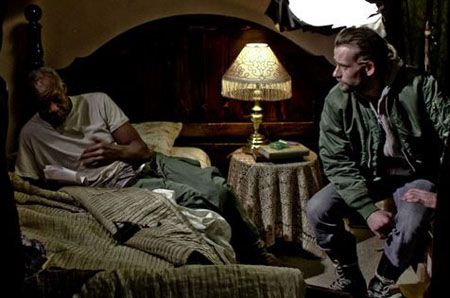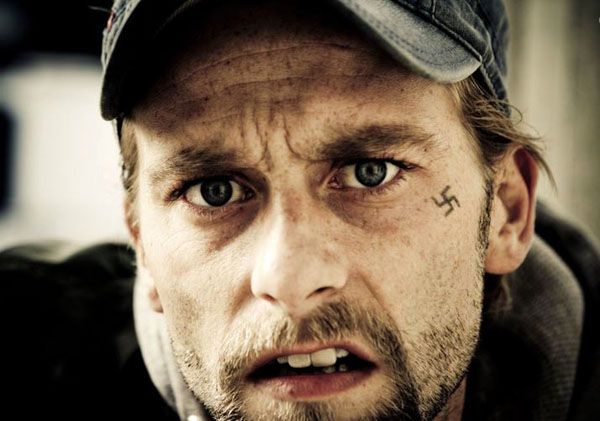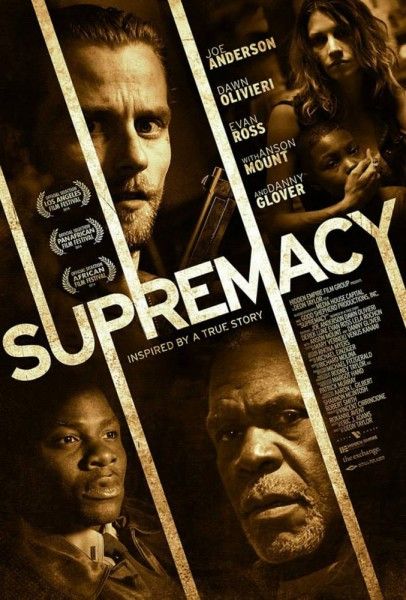In the indie drama Supremacy, Tully (Joe Anderson), an ex-con with the Aryan Nation, has just been paroled, but on his first night out, he kills a cop, setting off a chain of events that lead to a home invasion and hostages. As the police close in, and Mr. Walker (Danny Glover) fights back by turning the tables on Tully’s racism, it’s a tense journey to see who will make it out alive.
During this exclusive phone interview with Collider, actor Joe Anderson talked about how he got involved with the film, how tough it was to get through the shoot, both physically and mentally, his process for getting into Tully’s mind-set, working with Danny Glover, and why actors are all just “bare bums in the shower,” whether you’re the biggest star on the planet or this is your first film. He also talked about taking over the role of Mason Verger for the upcoming season of the NBC series Hannibal, making the character his own, and why he found all of the prosthetics freeing.
Collider: How did you originally come to this project?
JOE ANDERSON: The casting director has cast me in a few things now. She called my agent and sent my agent the script. I read it and was immediately drawn to it, for various reasons. My father grew up in Africa, so there were always conversations about race and racists, and what idiots they are, basically. It was something that I felt like I almost had to do. There was the fact that the protagonist of the script is the antagonist, and it follows the bad guy. We meet Tully as he leaves prison and we follow his journey. The change of ideology within that character was something that really drew me to it. It was not like any other race-based movie that I’ve seen. American History X is a very different way of looking at this. This was far more of a hostage situation. Within that setting and those parameters, the stakes are consistently higher than they were in any other movie that I’ve seen that deals with this subject matter. The challenge, for me, was to try to get some levity in it and approach it from a human point of view. Why is this guy thinking the way he’s thinking? Why is he doing this? That’s also incredibly hard when you’re in a hostage situation because you’re thinking purely about the practical and physical aspects of taking somebody hostage and hiding out in a house. That blend of the physical and tactical of what to do vs. the ideological aspects of it looked like a very tricky thing to take on. Essentially, that was one of the major draws for me, to the film.
You’re great in this film, but how difficult was it to get through playing such an intense role?
ANDERSON: It was incredibly tough to get through, not only physically, but mentally. The recovery process each day, in terms of hanging the character up on the wall and picking him up on the way back into work the next day, was so that I wasn’t carrying the burden of the filth coming from my mouth, most of the time. What I was doing was a real discipline, but it was an early lesson that I was taught in the theater. Years ago, I went into a theater rehearsal, one day, after having had an argument with my girlfriend, and the director said, “Something is wrong with you. Walk straight back out, hang it up on the clothes peg, and come back in.” That was the professional way of dealing with things, and that really came into play on this movie.
Was it ever hard to fully leave it there, especially when you had to be covered in tattoos?
ANDERSON: Those tattoos did come off. If there was a very quick turn-around and I had to be in very early in the morning, they’d stay on for a couple of weeks, if you didn’t scrub them too hard. So, sometimes I would have to go home with that on me. It was just more of a mental thing. Those always seemed like a costume or a mask, so to speak. It was more the physical and the language of it that lingered with me.
How do you think Tully viewed himself? Tully refers to himself as the devil, more than once. Do you think that’s a bravado that he puts on, or do you think that’s really how he sees himself?
ANDERSON: That’s an interesting thing. One of the things that I toyed with, in terms of backstory for this character, was whether he was a white supremacist before all of this. I never really got to do much research on the real guy, and I never really got to speak to the family that was involved. So, a lot of it was just my making it up, to be perfectly honest. I came to the conclusion that he was raised in an environment where racism was prevalent, and when you go to prison, you’re forced to side with your ethnic group, just on a survival level. If you say, “I’m not sure if I agree with how we’re talking about Hispanics, blacks, or any other ethnicity,” there would have been dire consequences for him. He was in prison for a long time, and it was almost conditioning for him. There were remnants of an innocent child in him. He knew that he was doing something wrong, but at the same time, it went against that conditioning. So, the innocence was so far buried within him that he was confused when the Aryan leader said, “You’ve gotta kill everybody in the house.” That was the moment where he went, “I’m not sure if this is absolutely right.” One of the things I didn’t want to do was paint him as a complete psychopath and a one-dimensional character, although the movie itself and the script wrote him that way. It was always a challenge to try to have as many human aspects to him as I could, as opposed to him just being a psychopathic racist. I went slightly against how the script was written, which did paint him more in that one-dimensional light.
What’s it like to work opposite a legend of film like Danny Glover?
ANDERSON: I didn’t really have too much to feed off of. Danny didn’t really speak to me that much throughout the filming of the movie. We must have exchanged two or three sentences as Joe and Danny, throughout the whole filming process. As for the collaborative aspect between Danny and myself, as much as I tried, I couldn’t really get anything from him, in that sense. Really, it was just left to me and the director to slip into this character and inhabit it and to not care. We’re all actors and we’re all bare bums in the shower, whether you’re the biggest star on the planet or this is your first film. More to the point, with the other actors who played the young kids and the mother, that was more of an area where I had more dialogue with those guys. There was a lot of love and support after each take, where I was being horrifically awful to these people. They’d call, “Cut!,” and I’d run over and hug them and make sure I wasn’t too rough. I wanted to build some sort of trust and support there. We’re all bare bums in the shower, so I’m never really phased by anything like that.
Because it has so many personal and historical connotations that come along with it, how difficult was it to use the N-word repeatedly, and to make it sound like it was something natural for you to say?
ANDERSON: Honestly, we grow up in a society where we revere Quentin Tarantino movies and the N-word is flung left, right and center by a lot of white people. These become hip-hop culture movies, to the point where Samuel L. Jackson will go and do a Quentin Tarantino movie. So, I think it’s to do with what the overall movie and message is. A word is just a word. It has no power unless people react to it and give it power. Some people can use that word and it’s allowed, and other people can’t use that word because it’s not allowed. That, in itself, gives the word power. If we did that to the word “bluebird,” then bluebird would become an awful thing to say to somebody. Really, it’s just a word, and it’s a word that belonged to that character, in that instance. No matter what it is, it is to do with the character and the movie. It’s not to do with me, at all. If I was going to play a gay individual, I would have no qualms about doing that because that’s what the movie and story is. Being a nasty person in the movie, and being somebody who does awful things, had resonant leftovers with me. I would go home and I would feel exhausted and pretty shitty, to be honest, because I felt like I’d been shitty to people, all day long. But the words themselves are not necessarily the issue. The script was very thin in places. Sometimes you get onto a set and the scene that read fine on paper, when you put it into its physical surroundings, you might realize that you need to add more, here and there. So, I did have to improvise a lot of it, and that was a little more tricky within the social dynamic. If I’m being forced to improvise racism, then it is coming from Joe and it’s not coming from the writing. That was something that I had to be very careful about, once they called, “Cut!” I had to say, “Sorry, guys, this isn’t me. It’s something I’m having to do because the writing lacked something, at this moment, to fill this space.” Really, it’s art. That’s the only way that I can think about it.
Your work in The Divide was really terrific, and it was exciting to hear that you were joining Hannibal. How did you come to take over the role of Mason Verger, and did you have any hesitation about taking over a role that had already been established by another actor?
ANDERSON: Not at all. Because every human being is different, I think that each actor will bring something quintessentially different to the role. Where I wanted to take the role, Bryan Fuller was in absolute support of. In a weird way, I don’t really care too much about what the fans think. I just care about the service that I’m paying to the amazing writing on that show, and to Thomas Harris and the original material. I was a huge fan of what Gary Oldman did in Hannibal, the movie, so he was my inspiration for that character, as opposed to anything else. I tend not to worry a lot about stuff like that. The way that I’m going to do something is the way that I’m going to do it. If nobody likes it, then nobody likes it. If they do like it, then they do like it. It’s not really something that goes through my head, to be honest.
Had you ever worked with prosthetics, to that extent, before, and was that daunting?
ANDERSON: It was actually quite freeing. The process of putting it on and taking it off was a little uncomfortable. You’re playing a very psychotic pedophile in a wheelchair, who is disabled from the neck down and can only move his right hand. That, in itself was a challenge, to not have the tools of physicality to aid your performance and keep it all within the very rich dialogue. I had to step up to the dialogue and do the dialogue justice. So, once the mask slipped on and I found the voice, it was almost like I had carte blanche to play and to do whatever I wanted to do, and that’s actually very, very freeing. It was good fun.
Supremacy is now playing in theaters and on VOD.


